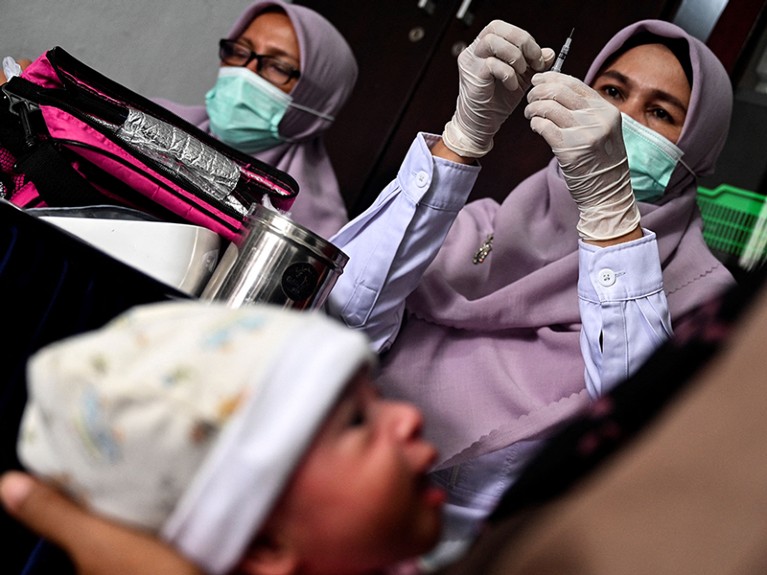
The world’s largest fund to detect and treat tuberculosis (TB), AIDS and malaria has secured US$14.25 billion in pledges for 2023–25 — almost $4 billion short of an $18-billion target.
The shortfall comes amid growing concern that the world’s total disease burden has increased, largely because the COVID-19 pandemic has disrupted programmes to detect and treat the three diseases.
Organizations working to combat the diseases say the shortfalls will continue to set back lifesaving campaigns. Under its allocation plans, the Global Fund to Fight AIDS, Tuberculosis and Malaria (known as the Global Fund), headquartered in Geneva, will allocate malaria programmes 50% of the funds up to $12 billion, and HIV/AIDS programmes 32%. The remaining $2 billion for TB is divided slightly differently — these programmes will receive the remaining 18% of funds up to $12 billion, and 25% above that.
TB needed a substantial funding increase, explains Lucica Ditiu, executive director of the Stop TB Partnership, a healthcare charity also based in Geneva, Switzerland. According to the organization’s calculations, TB programmes will get about $700 million each year. This is “exactly the same as during the current funding cycle, or zero additional money”, Ditiu told Nature.
Not enough
Global Fund donors announced their pledges at a meeting in New York City called the Seventh Replenishment Conference, which ended on 21 September. The biggest donation was from the United States, which pledged $6 billion, followed by $1.59 billion from France, $1.29 billion from Germany and $1.08 billion from Japan, altogether, a 20% to 30% increase from the previous cash replenishment.
However, the United Kingdom — previously the third largest donor — and Italy did not announce their contributions. Their deadline is the end of October. A statement from the Global Fund says the countries have promised to announce their pledges “in the coming weeks”.
Among the other funders, the Bill & Melinda Gates Foundation increased its contribution by 20%, to $912 million; South Korea has quadrupled its share to $100 million. Kenya has also increased its contribution, to $10 million.
At the fund’s sixth replenishment conference, in October 2019, donors pledged $14.02 billion for 2020–22, later extended to $18.5 billion during the pandemic. Of this total, the fund has received $11.9 billion.
“Even assuming that the UK and Italy will together add $1 billion more, and the total replenishment will become $15 billion, TB will still get the lowest amount of all diseases — around $850 million each year — a drop in the ocean of needs. We will not end TB with this amount,” says Ditiu.
Effects of the pandemic
The pledges come amid an increasing burden from HIV/AIDS, malaria and TB, even though the fund has contributed considerably towards eliminating these diseases. In the two decades since the Global Fund was set up in 2002, it has raised more than $55 billion, which has helped to save 50 million lives. However, in the past few years, the number of people receiving diagnoses and treatment has dropped in many areas owing to pandemic restrictions and impacts on health-care systems.
The World Health Organization says that the number people who received a TB diagnosis fell from 7.1 million in 2019 to 5.8 million in 2020. TB deaths, meanwhile, increased from 1.2 million among people without HIV in 2019 to 1.3 million in 2020.
In 2019, 1.7 million people were newly diagnosed with HIV, according to the Joint United Nations Programme on HIV/AIDS. Reported new infections fell to 1.5 million in 2020 and AIDS-related deaths fell slightly, from 690,000 people in 2019 to 680,000 in 2020.
Malaria diagnoses, by contrast, increased from 227 million people in 2019 to 241 million people in 2020. The number of deaths also increased: some 627,000 people died from malaria in 2020, 69,000 more than in 2019.
Pandemic disruptions hit the Global Fund’s operations hard. The number of people treated for drug-resistant TB in the countries where the fund works dropped by around 19% from 2019 to 2020, falling to 100,000. Similarly, the fund’s HIV prevention programmes and services reached 8.7 million people in 2020, around 11% fewer than in 2019, according to a spokesperson. But last year, these figures began to improve. In 2021, 110,000 people were treated for drug-resistant TB and 12.5 million were able to access HIV-prevention programmes in the countries where the fund operates.
Donors’ commitments to the Global Fund are “critical” to getting the world on track to end malaria, which kills a child every minute, says Corine Karema, interim chief executive of the RBM Partnership to End Malaria, based in Geneva, which coordinates global action against the disease. “Any shortfall in funding would have serious implications for countries across the world still affected by malaria, potentially putting lives at risk.”
"Short" - Google News
October 05, 2022 at 04:14PM
https://ift.tt/HLRT0K9
Lifesaving fund to fight AIDS, malaria and TB falls short of $18-billion target - Nature.com
"Short" - Google News
https://ift.tt/RXmSynj
Bagikan Berita Ini














0 Response to "Lifesaving fund to fight AIDS, malaria and TB falls short of $18-billion target - Nature.com"
Post a Comment